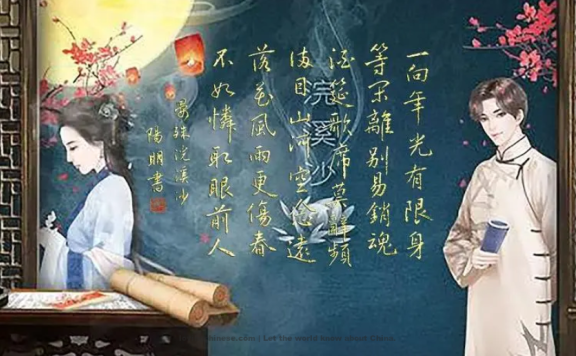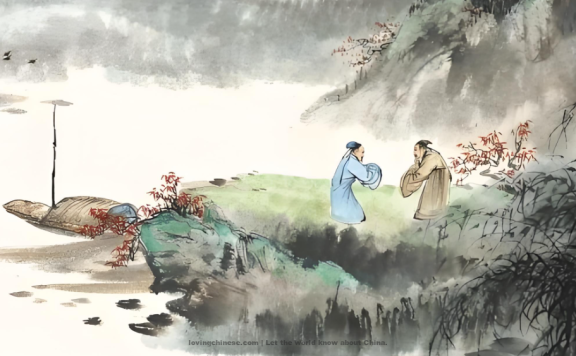-
Yan Shu: The Moon at the Mid-Autumn Night
中秋月 晏殊 十轮霜影转庭梧,此夕羁人独向隅。 未必素娥无怅恨,玉蟾清冷桂花孤。 The Moon at the Mid-Autumn Night Yan Shu The pale moon shadow moves past the yard’s phoenix tree, On this night the sojourner alone is sad as sad could be; The Moon Goddess Chang-e must have the same feeling: She has only toad and osmanthus to keep her company. (陈君朴 译)- 81
- 0
-
Yan Shu: Spring in Jade Pavilion Spring Grief ~ 《玉楼春·春恨》 晏殊 with English Translations
"Spring Hate in Yulouchun" is a work by Yan Shu, a writer in the Song Dynasty. This poem describes the reluctance to part and the endless sorrow after parting, expresses the pain of parting and longing in life, and expresses the author's feelings about the brevity of life, the impermanence of gathering and separation, and the loneliness after a grand feast. 《玉楼春·春恨》是宋代文学家晏殊的作品。此词描写送别时依依难舍的心情和离别后无穷无尽的离愁,抒写了人生离别相思之苦,寄托了作者从有感于人生短促、聚散无常以及盛筵之后的落寞等心情生发出来的感慨。 《玉楼春·春恨》 晏殊 绿杨芳草长亭路,年少抛人容易去。楼头残梦五更钟,花底离愁三月雨。无情不似多情苦,一寸还成千万缕。天涯地角有穷时,只有相思无尽处。 Spring in Jade PavilionSpring Grief Yan Shu Farewell Pavilion green with grass and willow trees!How could my gallant young lord have left me with ease!I'm woke by midnight bell from dim dream in my bower;Parting grief won't part with flowers falling in shower.My beloved feels no sorrow my loving heart sheds:Each string as woven with thousands of painful threads.However far and wide the sky and earth may be,They can't measure the lovesickness o'er whelming me.- 88
- 0
-
Yan Shu Poem: Silk-washing Stream – 晏殊《浣溪沙·一向年光有限身》
"Silk-washing Stream" is a lyric written by Yanshu, a lyricist of the Northern Song Dynasty.- 20
- 0
-
Yan Shu Poem: Silk-washing Stream – 晏殊《浣溪沙·一曲新词酒一杯》
"Silk-washing Stream" is a lyric by Yanshu of the Song Dynasty.- 19
- 0
-
Yan Shu Poem: Butterflies in Love with Flowers – 晏殊《蝶恋花·槛菊愁烟兰泣露》
"Butterflies in Love with Flowers" is a lyric by Yanshu, a writer of the Song Dynasty.- 74
- 0
-
Yan Shu Poem: Treading on Grass – 晏殊《踏莎行·祖席离歌》
The song "Treading on Grass" is a work by the Song Dynasty lyricist Yanshu, and was selected as one of the "Three Hundred Song Lyrics".- 18
- 0
-
Yan Shu Poem: To One Unnamed – 晏殊《寓意》
寓意 晏殊[1] 油壁香车[2]不再逢, 峡云[3]无迹任西东。 梨花院落溶溶月[4], 柳絮池塘淡淡风[5]。 几日寂寥伤酒[6]后, 一番萧索禁烟[7]中。 鱼书[8]欲寄何由达? 水远山长[9]处处同。 注释: [1] 晏殊:是个神童,做过宋朝宰相。《千家诗》注说:“此有所思之诗也。油壁香车,美人所乘。峡云,神女行云行雨;任西东,不定之意。梨花月下,杨柳风前,言所遇之处,今杳然不可见也。寂寥于酒后,萧索于清明,伤春之际也。鱼书欲寄而无由,水远山长而无人可托,徒有忧思感叹而已。”诗人遇见一个美人,有如楚王梦中的神女,化为行云流水,无影无踪。古人相信鱼雁可以传信,但信也无处寄;只好见景伤情,咏诗寄托相思了。这说明了宋代婚姻恋爱都不自由,诗词就成了知识分子苦闷的象征了。 [2] 油壁香车:古代女子乘坐的轻便美丽的车子,车壁以油漆涂刷。 [3] 峡云:巫山上的云彩,此处代指情人。 [4] 溶溶月:如水的月色。 [5] 淡淡风:轻柔的春风。 [6] 伤酒:饮酒过量。 [7] 禁烟:指寒食节禁火。 [8] 鱼书:书信。 [9] 水远山长:水路遥远、高山绵延,形容路途阻隔。 To One Unnamed Yan Shu Your fragrant cab has never come again in sight, As traceless clouds in royal dream waft where they please. The courtyard white with pear blossoms steeped in moonlight, The pond is rippled by willow down in the breeze. So many lonely hours cannot be drowned in wine; I feel all the more desolate on Cold Food Day. Would fish or wild geese send you a letter of mine? Everywhere mountains and rivers bar our way. 《寓意》是北宋诗人晏殊创作的一首七言律诗。这是抒写别后相思的恋情诗。首联追叙离别时的情景。颔联寓情于景,回忆当年花前月下的美好生活。颈联叙述自己寂寥萧索的处境,揭示伊人离去之后的苦况。尾联表达对所恋之人的刻苦相思之情。 "To One Unnamed" is a seven-line poem written by the Northern Song poet Yanshu. It is a love poem about love after parting. The first couplet recalls the scene of parting. The first line recalls the scene of parting, and the second line recalls the beautiful life in front of flowers and under the moon. The neck line describes his own lonely and depressed situation, revealing the misery after the departure of his lover. The last couplet expresses the bitterness of longing for the one he loves.
Checking in, please wait...
Click for today's check-in bonus!
You have earned {{mission.data.mission.credit}} points today
My Coupons
-
¥CouponsLimitation of use:Expired and UnavailableLimitation of use:
before
Limitation of use:Permanently validCoupon ID:×Available for the following products: Available for the following products categories: Unrestricted use:Available for all products and product types
No coupons available!
Unverify
Daily tasks completed





















